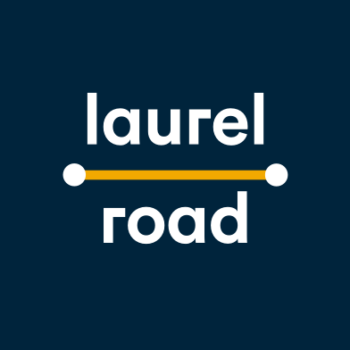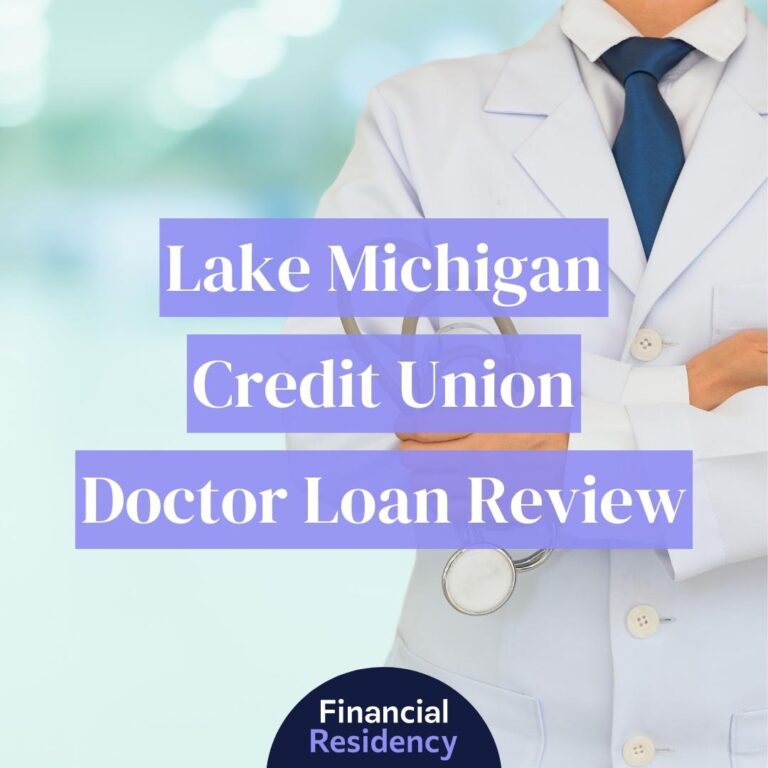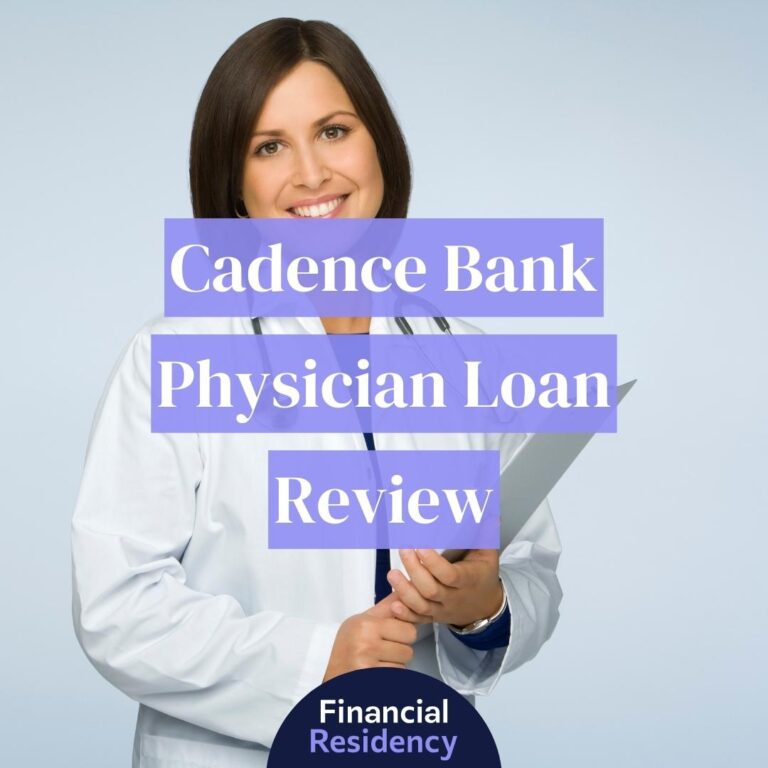Laurel Road (NMLS #399797 Equal Housing Lender) is a digital banking platform known for student loan refinancing. However, it specializes in a range of tailored solutions for business and healthcare professionals, including student loan cash-back credit cards and custom physician home financing.
Its doctor home loan program offers specialty home loans to doctors, dentists, fellows, interns, residents, researchers, and clinical researchers with an eligible degree and current license. Doctors appreciate that Laurel Road caters to both medical school students and healthcare industry professionals.
The underwriting process and eligibility requirements for doctor loans are much more lenient, with curated options such as waived private mortgage insurance (PMI), flexible debt-to-income (DTI) calculations, and zero money down financing.
This article will review Laurel Road’s physician loans in greater detail, outlining eligible degrees, financing terms, and maximum loan amounts. We’ll also cover more information about Laurel Road and how its physician loan compares to other similar bank programs.
About Laurel Road
Laurel Road is a member FDIC bank founded in 2013. It combines the innovative capability of a fintech company with the credibility of a bank and offers tailored financial solutions for medical and business professionals.
- BBB Score: A+
- CEO: Alyssa Shaefer (General Manager and Chief Experience Officer)
- JD Power Score: NA
- Parent Company: KeyBank
- Phone Number: 1 (833) 427-2265 or 1 (877) 801-4686
- Services Offered: Student loan refinancing, rewards checking accounts, high-yield savings accounts, cash-back credit cards, personal loans, and home loans, including physician mortgages
Laurel Road Physician Loan: Fast Facts
Here are a few fast facts about Laurel Road’s physician mortgage loan program.
- Discounts: $650 off closing costs, 0.25% member rate discount
- Financing Options: 100% financing offered
- Physician Loan Products: Fixed-rate and adjustable-rate mortgages
- Maximum Loan Amount: 100% financing on loans up to $1 million, additional financing with a down payment
- Qualifying Degrees: MD, DO, DPM, DDS, DMD
- Private Mortgage Insurance (PMI): Not required
Laurel Road Physician Loan: Qualifications
Published details for Laurel Road physician loans, apart from qualifying medical professionals, are sparse. Underwriting is bespoke based on the individual borrower‘s personal finances. Overall loan terms are more lenient than with conventional home financing.
Laurel Road’s physician loan qualifications are:
- Fair to Excellent Credit: 660-700 minimum credit score estimated range
- Down Payment: 0% down payment on loans up to $1 million
- Owner-Occupied Property: Must be used to purchase or refinance a primary residence
- Eligible Degree: Must have a medical doctor, doctor of osteopathy, doctor of podiatry, doctor of dental surgery, or doctor of dental medicine. This includes licensed practicing physicians, residents, fellows, doctors, clinical professors, researchers, or managing physicians.
- Verified Income: Pay stubs or signed employment contract
Laurel Road does not stipulate any minimum credit score requirements on its website, however, it does state that all home financing products are subject to credit and collateral approval.
Additionally, the bank may impose a requirement for minimum cash reserves on hand. Discover The Best Lenders Answer just a few questions about your career, where you're buying, and how much you want to borrow. Our service will then show you the exact programs you're eligible for from vetted physician loan specialists who will guide you through every step of the process – obligation-free!
How to Apply
The mortgage application process can seem daunting, but when you know what to anticipate at each phase of the process, it can go much smoother. And with the ability to submit an online application and do everything electronically, it simplifies things further. Here’s what you can expect at each step of the mortgage approval process.
Get Prequalified
This is the first step where you provide some initial information to the lender about your household income, debts, and assets and they will give you an estimated figure of how much you may be approved to borrow.
Generally, this involves a soft credit pull to give you an informal calculation. While you cannot get approved from the pre-qualification stage alone, you must get pre-qualified before you can ultimately get approved.
At this step, some home buyers find a real estate agent and begin looking at properties.
Prepare Your Documents and Review Your Credit Report
Be prepared to provide a lot of documentation (and endless additional documentation) throughout the mortgage application process and then consent to a hard pull of your credit report.
Documents you’ll need to gather include pay stubs or a future-dated employment contract, tax returns, proof of other sources of income (i.e., spousal support), bank statements, investment statements, and retirement account savings.
The lender may request that your bank account balance reflect enough liquidity to cover any down payment, closing costs, and additional cash reserves. Additionally, if you do have any gift funds you will need documentation (a letter of explanation) indicating the source of those funds.
You should also make sure to review your credit report to look for any inaccuracies. If you apply for financing through multiple lenders, you may have different credit bureau reports to look over. (While these are all hard pulls, if there are multiple inquiries within a short span this is regarded as rate shopping and it will not be held against you; all of these pulls will be treated as one inquiry.)
Get Pre-Approved
Receiving pre-approval is when the bank qualifies you for a specific home loan amount. This figure is good for 90 days, so it’s important to hold on getting pre-approved until you are ready to begin seriously looking at homes.
You can initiate the pre-approval process online or by calling a KeyBank mortgage representative at 1 (877) 801-4686.
While your pre-approval figure is valid for 90 days, this doesn’t mean that the financing will ultimately go through.
If there is a change in your credit score, debt-to-income ratio, earnings, or the bank’s underwriting policies, it’s possible the pre-approved amount could go down, your interest rate could increase, or any financing could completely fall through.
Additionally, a mortgage lender may extend conditional pre-approval. This means the pre-approval is offered on condition of meeting specific caveats, like setting up direct deposit and automatic mortgage payments with the bank, or increasing your total available cash reserves.
Confirm and Lock in the Rate
As with your pre-approval amount, a loan officer from Laurel Road Bank will follow regarding your interest rate and payment options.
The interest rate that Laurel Bank extends is locked in for 45 days. Even if you do close within 45 days, the ultimate interest rate may be different. Changes in market conditions, a decrease in your credit score, an increase in your debt-to-income ratio, or a closer review of your loan application can alter your closing mortgage interest rate.
Alternatives
In addition to Laurel Road Bank, many other banks and credit unions offer physician loan financing. Here are other programs to consider that may offer more financing or different eligibility guidelines.
1. U.S. Bank
Financial giant U.S. Bank offers specialty doctor financing to purchase or refinance owner-occupied homes in the District of Columbia and all 50 states. Eligible professions for this program include Medical Doctors (MD), Doctors of Osteopathy (DO), or Attorneys (JD), as well as physician residents and fellows,
U.S. Bank does not have any zero money down mortgage options, however, they will offer 95% financing on home loans up to $2 million and there are no private mortgage insurance (PMI) requirements for any physician loans. U.S. Bank offers both fixed-rate and adjustable-rate mortgage products, and qualified borrowers can receive mortgage loans up to $2.5 million.
The bank’s physician program does look at any student loan debt when calculating your debt-to-income (DTI) ratio, if repayments are on deferment U.S. Bank will use 2% of the outstanding balance to count toward your debts in their DTI calculation.
Additionally, U.S. Bank requires borrowers to have a minimum credit score of 710 and cash reserves of three (3) months to twelve months depending on the mortgage terms and total amount financed.
2. Flagstar Bank
National lender Flagstar Bank provides mortgage origination and financing in all 50 states, extending physician home loans to U.S. citizens, permanent residents (Green Card holders), and qualifying H-1B visa holders. The bank’s professional mortgage program provides up to $1.5 million in total financing and eligible borrowers can borrow up to $1 million with no down payment.
Borrowers must have a FICO credit score of at least 720 and be new career professionals with 10 years or fewer of working experience in their occupation.
As a major program perk, Flagstar’s program is extremely inclusive and is open to nurses, veterinarians, ophthalmologists, and other occupations that are usually ineligible for medical mortgage financing. Flgastar’s program extends to a broad range of occupations both in and outside of the medical field
3. Bank of America
Bank of America (BOA) offers up to $2 million in home loans to medical professionals through its specialty doctor program. BOA does not offer borrowers any zero money-down financing options, but its program does feature more lenient down payment and credit score requirements.
BOA requires a down payment of just 3% for mortgages up to $850,00, or down payments of 5% to 15% for additional financing up to $2 million. Additionally, BOA has no PMI requirements and excludes student loan debt from its DTI ratio calculations.
The program is open to Medical Doctors (MD), Dental Surgeons (DDS), Dentists (DMD), Doctors of Optometry (OD), Doctors of Podiatric Medicine (DPM), or Doctors of Osteopathy (DO).
4. Evolve Bank & Trust
Evolve Bank & Trust operates a physician mortgage program that extends up to $2 million in financing to eligible medical doctors across all 50 states. Qualified borrowers can receive 100% financing for mortgages up to $1 million or up to $2 million with a down payment.
Although Evolve does not offer any fixed-rate mortgage products, the bank does offer construction loans (for new home builds) in addition to adjustable-rate mortgages (ARMs).
Beyond new construction, Evolve Bank will also finance single-family homes, multi-family homes, condominiums, HOA properties, vacation homes, and co-ops. While most physician programs extend loans only for owner-occupied single-family homes, Evolve offers remarkable flexibility.
Additionally, Evolve Bank is one of the few physician mortgage programs to extend mortgages to chiropractors and clinical nurse specialists. Eligible healthcare degrees include:
- Medical Doctors (MD)
- Osteopathic Doctors (DO)
- Dentists (DMD and DDS)
- Optometrists (OD)
- Pharmacists (PharmD)
- Podiatrists (DPM)
- Physician Assistants (PA)
- Chiropractors (DC)
- Veterinarians (DVM)
- Certified Registered Nurse Anesthetists (CRNA)
- Nurse Practitioners (NP)
- Clinical Nurse Specialists (CNS)
5. TD Bank
TD Bank provides specialty home loans to physicians for up to $2 million. Well-qualified borrowers can receive mortgages up to $750,000 with no money down. Additionally, TD Bank provides both adjustable-rate and conventional fixed-rate mortgage options and holds no PMI requirements.
The program is designed for current checking account holders with fewer than 10 years of work experience as a practicing physician (MD, DO, DPM, DDS, DMD) or licensed residents and fellows. Self-employed doctors and dentists with at least two years of work history and 1099 income may also qualify.
TD Bank’s medical professional mortgages are available in CT, DE, FL, MA, MD, ME, NC, NH, NJ, NY, PA, RI, SC, VA, VT, and Washington D.C.
Pros and Cons
Pros
- 100% financing available for home loans up to $1 million
- Fixed-rate and adjustable-rate mortgage options
- Open to residents, interns, and fellows completing training in a qualifying medical field
- No private mortgage insurance (PMI) requirements which can save up to 2% on monthly payments
- Member discounts; save up to $650 off closing costs
Cons
- Narrow range of eligible medical professions compared to other medical mortgages
- Student loan debt is included in debt-to-income (DTI) calculation; most physician loans exclude student loan debt in determining the DTI ratio
- *Not available in all 50 states
*Laurel Road Bank notes that not all home lending products are available in all states, although it does specify which states are (in)eligible.
Frequently Asked Questions
Is Laurel Road a Good Lender?
Yes, Laurel Road Bank is a solid lender. Founded in 2013, the bank is best known for its education financing solutions including private student loans, student loan consolidation, and student loan refinancing.
The bank also offers a wide complement of banking and loan products, designed to meet the needs of doctors, nurses, and business professionals.
Laurel Road has an A+ rating with the Better Business Bureau and is a member FDIC equal housing lender.
What is the Minimum Credit Score for Laurel Road?
While a minimum credit score for physician mortgages is not disclosed, a 660 credit score is required for many other Laurel Road personal loans. Check with a bank representative for more details.
Is Laurel Road Owned by KeyBank?
Yes, Laurel Road was purchased by KeyBank in 2019. This was a strategic acquisition to increase KeyBank’s digital capabilities and portfolio of end-to-end lending products.
Is Laurel Road Bank FDIC Insured?
Yes, Laurel Road Bank is FDIC insured. Deposit accounts are insured up to $250,000 per account holder.
Can Retired Doctors Get a Laurel Road Physician Mortgage?
No, Laurel Road’s physician program is specifically for practicing physicians or those with a future-dated offer of employment.
Retired physicians may be able to obtain this specialty financing at other banks, however, there may be better money-saving options. Physician loans are designed to assist new doctors who, burdened with student loan debt, often cannot qualify for conventional mortgages. Established or retired physicians generally have a different debt load and financial outlook and can qualify for better-priced, mainstream products.





